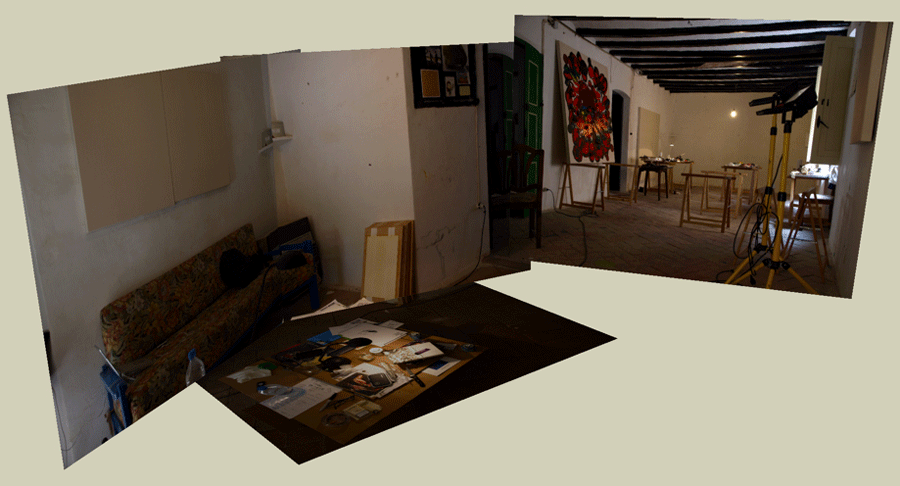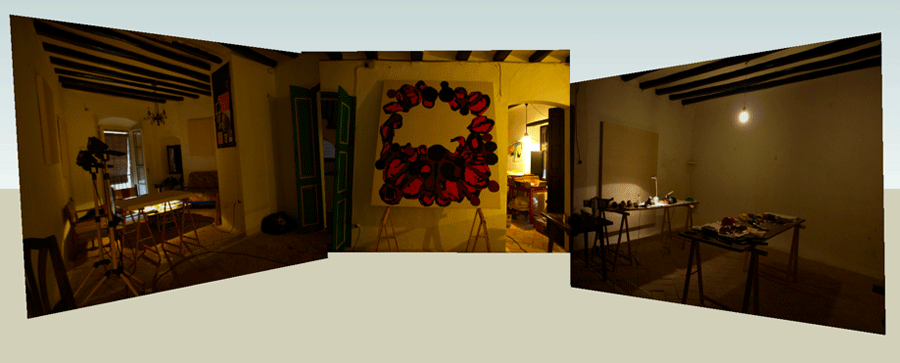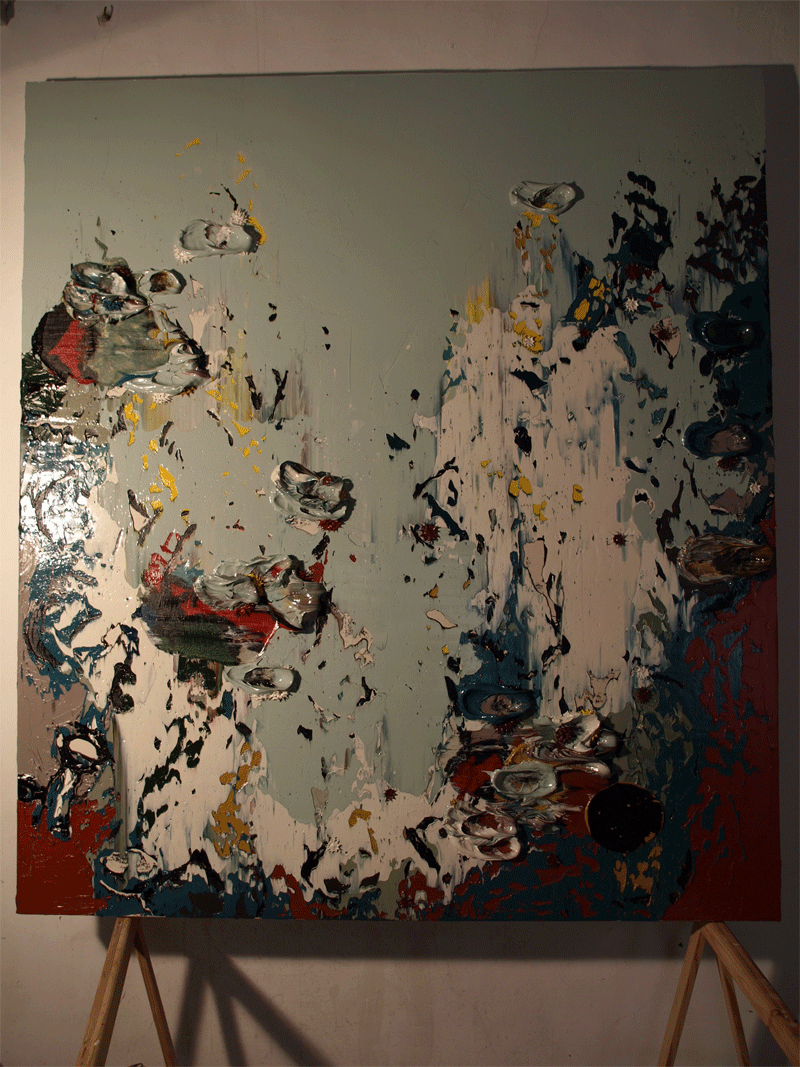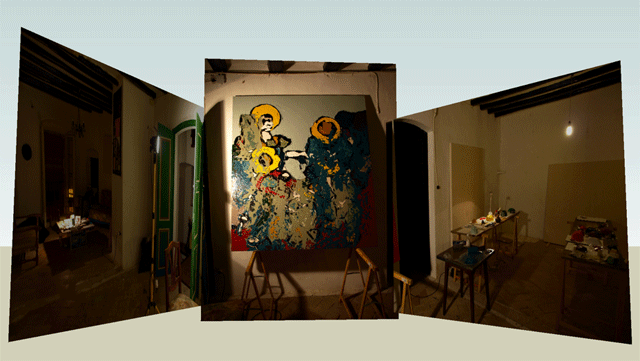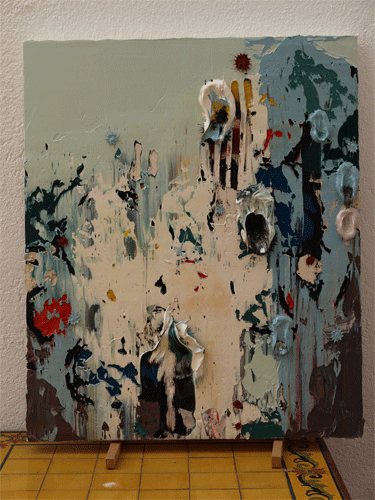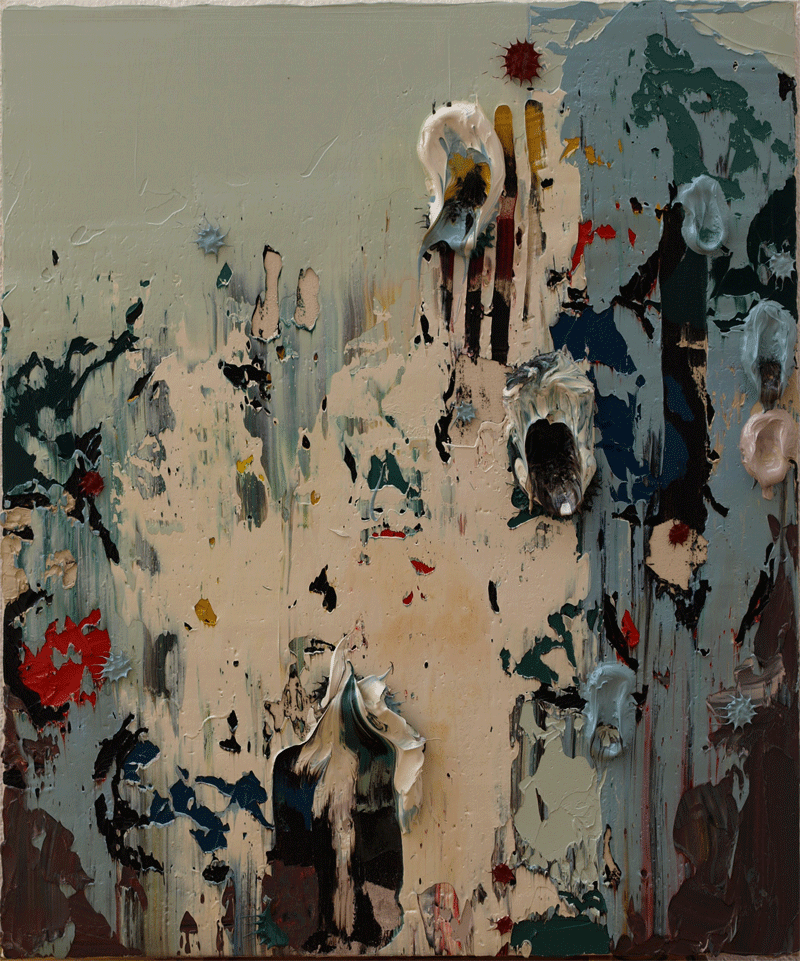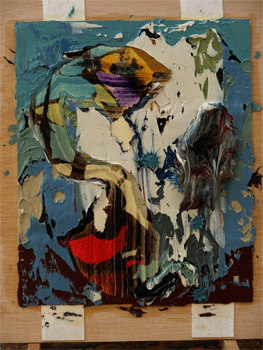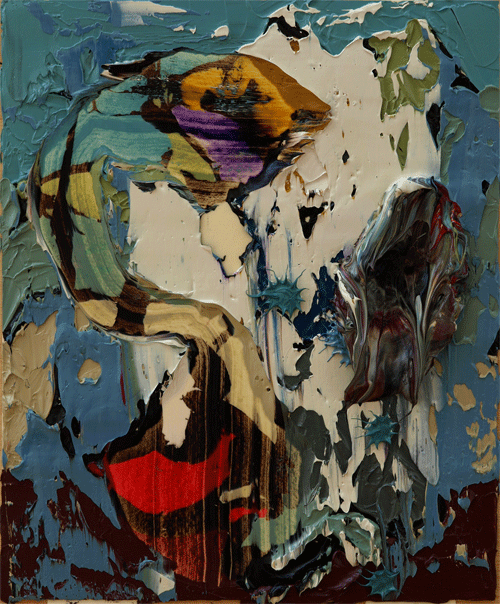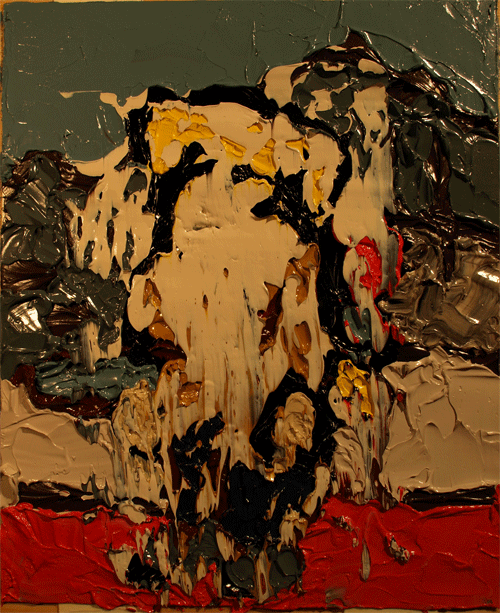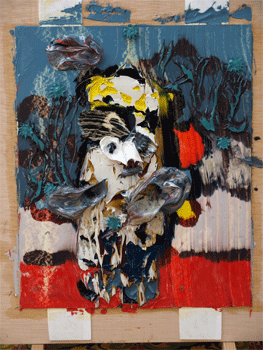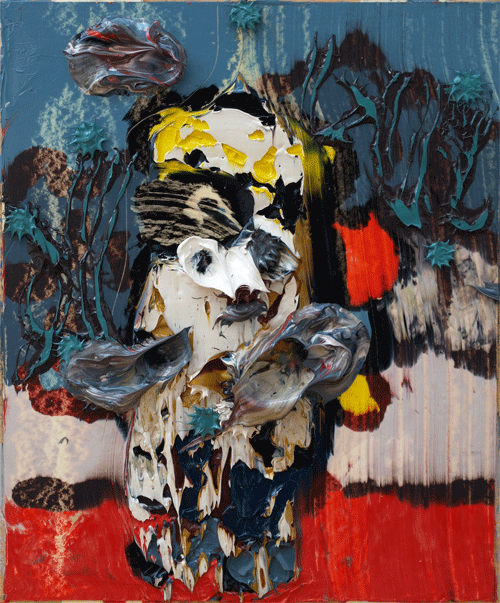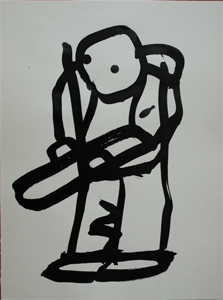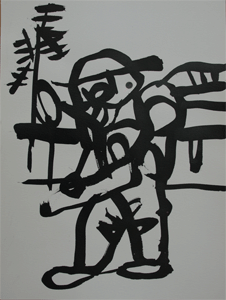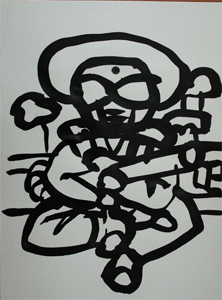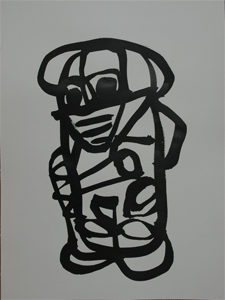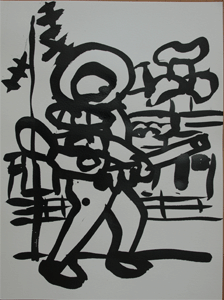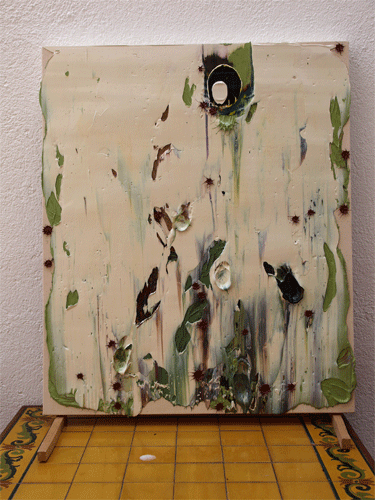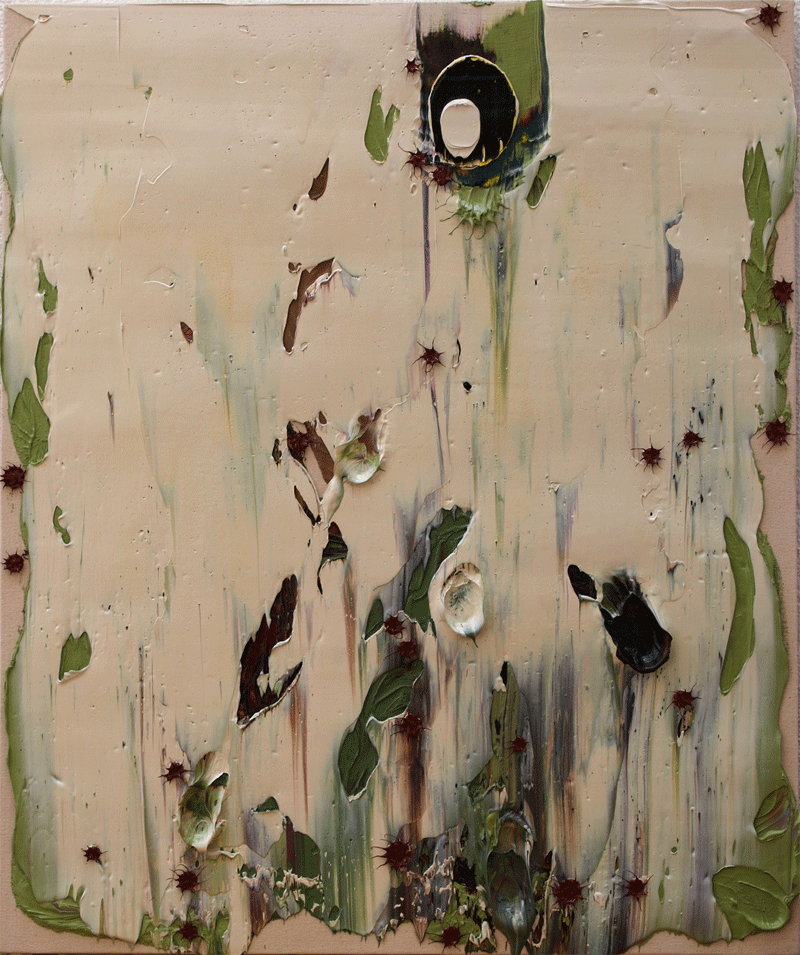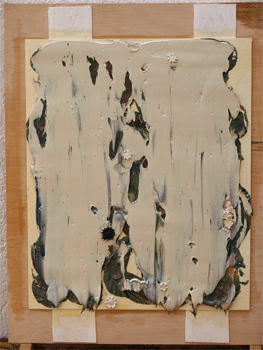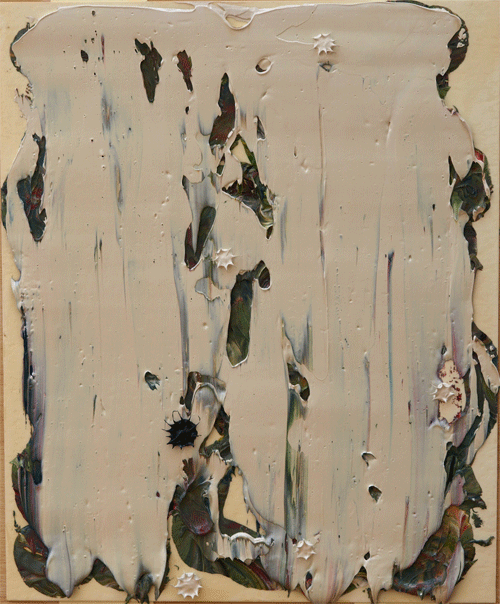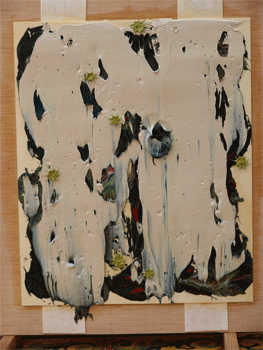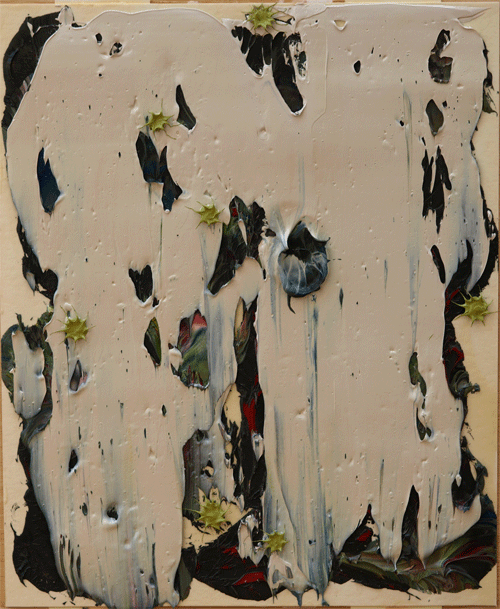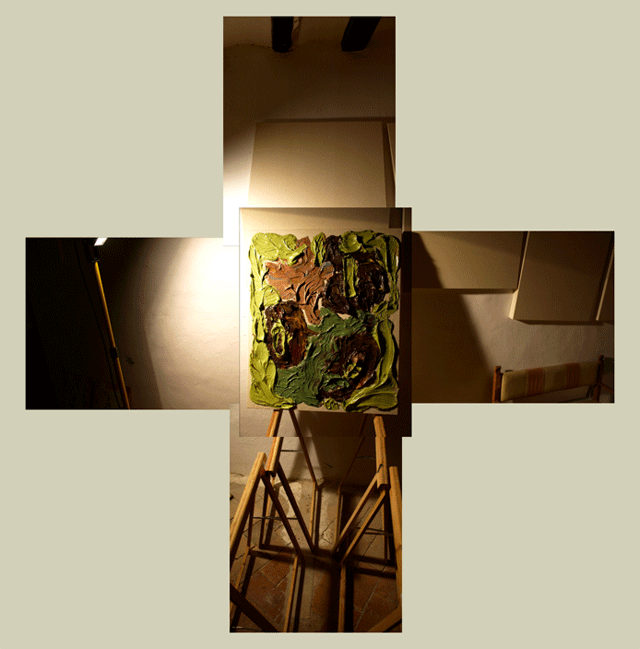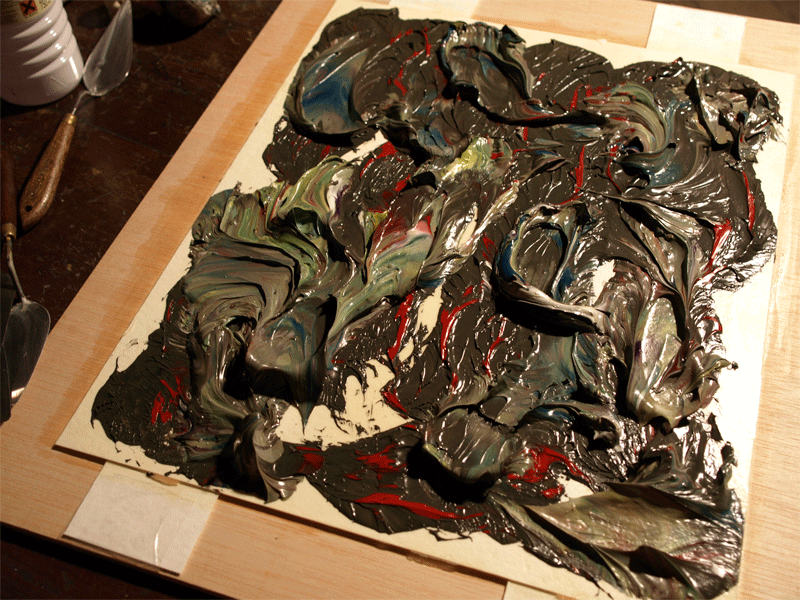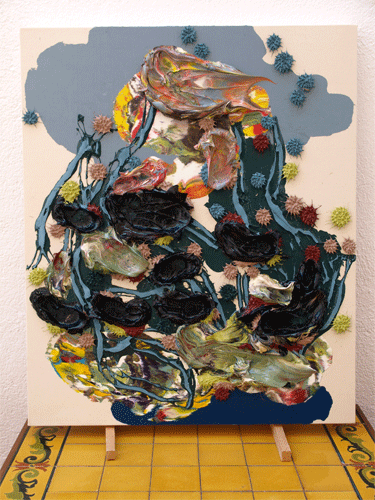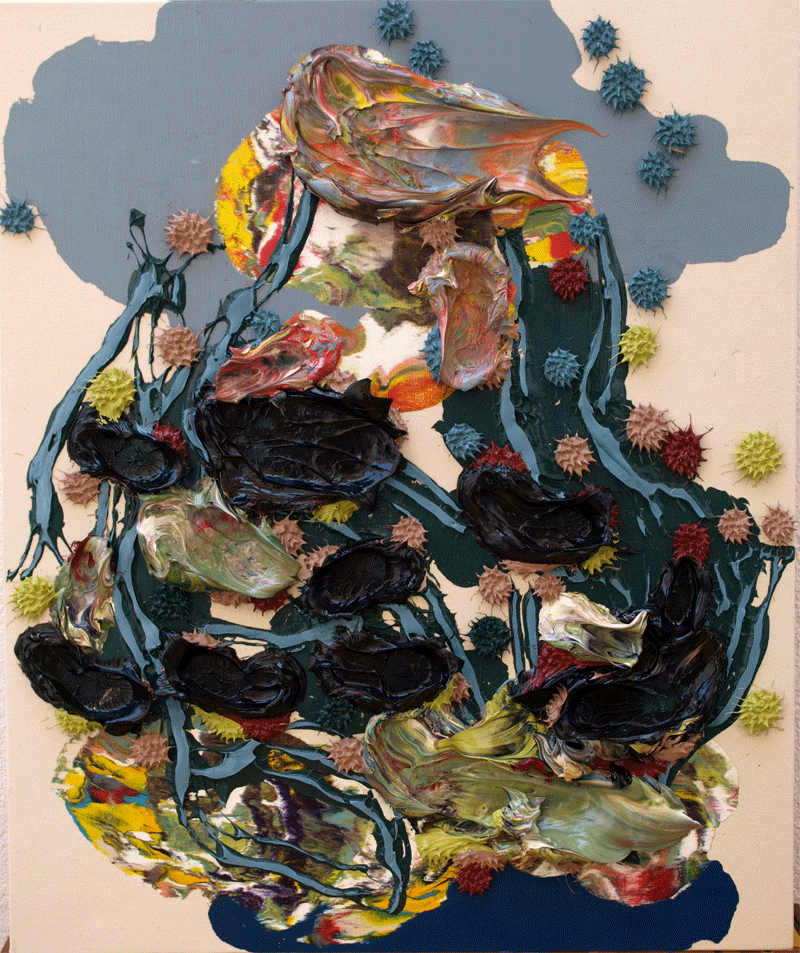August 29, 2008
August 25, 2008
August 22, 2008
Rojo y Azul
One night, as we sat out under the night sky at Codolar Cove, magician and performer Germ?n Bernardo a.k.a. EL MAGO PAN told us a story about Rojo y Azul.
Alberto met Germ?n while trekking the Santiago de Compostela, they became fast friends ever since. He's from Toledo (if my memory serves me correctly) and he's a mathematician who teaches by day and a performer by night. Specifically, he's a magician, and a very very good one. As we walked the streets of Tossa, people called out his name, "?Mago, Mago, ven aqui por favor!", such an effect he had on people. What is interesting is that he is an artist who has both made his own art world and simultaneously belongs to a fraternity of conjurors that stretches back into prehistory.
This small impromptu performance on Codolar Cove was the last time I saw him, he was headed for an acting class in Valencia. The video is terrible visually (except for the moon over his shoulder) but Germ?n's story and elocution is wonderful and I thought worthy of sharing with you here.
August 19, 2008
A Walk to Codolar Cove
A side note: This video was the last moment of contact... well, here's how I recounted the story to a friend:
Recently, yesterday, I had the adventure of losing my keys in a snorkel dive in Codolar Cove. (!) They were in a small leather key bag, along with my bank debit card, my only means of getting cash from the bank machine. And I had recently made a withdrawal, so there was 200 euros in cash there too. (!) (!) (!) I had a swimsuit with pockets and I must have forgotten about the treasure. Kiko and I combed the sea bottom for hours afterward, completely worked out, sea soaked and sun drenched we were.Nothing.
Either King Neptune has the booty ...or some lucky, lucky tourist.
The feeling of being so far away from one's anchored home with nothing but a swimsuit and swim gear! Wonderful, in funny, bracketed way. In short time, I was able to get another key from Kiko and into the house and cancel the card and further credit to my bank, they have sent a replacement via UPS to arrive perhaps tomorrow. Even though I have some money lent to me from Alberto, I put on my hat and when people ask me why I'm wearing it, I place it on the floor in front of them and I dance a funny dance to their laughter. Very amusing.
Fun, huh?
Now, the card has been cancelled, the locks will be changed soon and the 200 euros is a somewhere on the sea floor. Or so I'd like to imagine.
August 17, 2008
Jacques' Cri de C?ur

Fellow ChinaTown/LA artist Jacques de Beaufort has been ratcheting up a kind of manifesto recently, a heartfelt clarion call for the art world at large and a personal program that has promise to become a philosophic armature for his exercise of psychedelic phantasmagoria imagery in particular. Its a difficult subject for many reasons, not the least of which is its ungainlininess and the sheer vastness of scale as it spans from the intimacy of the artist's studio through the hall of mirrors that is contemporary pop culture, past the miserable scrum of Left/Right politics and into the heart of philosophy in its' grandest aspect.
Forgive me for what is promising to be a barrel ride over the falls. It's time to pop some of these thought bubbles and get back into the studio to start the next painting. Let's jump down a rabbit hole, shall we?
Jacques' Argument
In his Wednesday, May 28th 2008 blogpost Childhood's End: The practice of Art in a Post-Oil Age, he advanced a two part critique where first he endorsed Peak Oil Theory wherein he identified our wayward tendencies (in terms of a critique of societies' consumption of natural resources) with our present hypertrophic state in the late great Post/Modern art world. Here is a snip (Jacques has written more since then, but alas I am writing this in travel mode without an internet connection, uploading every other day or so):
In the chaotic turnover of a Post-Oil society, both the Left and the Right will fail as neither politic proves that it can fully grasp the ecological realities at hand and make good on their promise to restore the world to an order that has become systematically obsolete. There will be fascism on both sides of the aisle, and in the end, only the politics of Reality will prevail. It is important to remember that in the internecine struggles that are sure to come, that abstractions will become less and less valuable in terms of political and intellectual capital, replaced by concrete realities and visible, immediate affect. Objects and evidence will be the only measure of worth, and the de-tumescent corpse of hype and fashion will lie withering on the battlefield. Similarly, the bloated pathological narcissism of today's art stars will be seen for what it is, as a less conspicuous form of cultural production begins to circulate and take hold among those that remain in power. Gone will be the elevation of banality, and the epic Wagnerian farce of hermetic psychodramas writ large in the language of high art music video. Conceptualism and Pop will meet similar fates, as they are blown into the wind once it is realized that man cannot live on air and candy. Say goodbye to post-modern bricolage, there will be plenty of trash around already, and as the Duchampian Era closes down shop, the pathetic gesture of "post-modern appropriation" will be seen for the infantile and pat strategy that it is.
As for the first half of his campaign, I don't believe in Peak Oil Theory. Time will tell, the confirmation will come shortly enough. Remember the recent Y2K computer clock crisis? What is curious is that humanity has been driven by petrochemical fuel since the dawn of the Industrial Revolution and what is called technological singularity (the astonishing acceleration of change in our time) might require a complimentary quantity of energy to boost us into this new frontier. Or not. There is also the counter theory that the Information Age will boost performance enough to ease future energy needs. Whatever the case, nothing equals oil in terms of per unit yield of energy... except nuclear power... or the near future prospects of space based solar. Here's my point: solutions exist and they should be pursued vigorously. They should be pursued and the fruit of Modernity should be grown. Therefore, I here cast my vote to fuel modernity and to banish the siren song of sustainabilty whose hidden agenda I strongly suspect is the deindustrialization of humanity, atavism in another guise. With all this said, I agree with him in the latter half of his critique, insofar as it is rooted in a critical assessment of the current dissipated state of the art world dialogue and a call for a reassessment of the entire Post/Modern epoch root and branch.
Awesome, dude.
Go Jacques.
Elsewhere in ChinaTown, the critique went like this: "Complete rubbish.", a said a friend with an incredulous grin when the subject of Jacques' essay came up. There wasn't time to get enough of the particulars but I took this to mean that an artist who systemizes their thoughts too much unnecessarily constricts freedom of movement. Or maybe the crowbar of Peak Oil was an inelegant tool for the souffl? of art theory? Or maybe there are those who think that there are a lot of babies in the bath water of our art world dialogue, and a call for a turn of the page in the journal of art history is too rash, another possibility. Or maybe there are an awful lot of intellectual hotshots in our art world and an authentic cri de c?r is super, super risky business. What's the saying: that when one attacks the king, to be sure to kill him? Or is it because many of us in the art world did not want to traffic in terms such as "Post/Modernism", since the early 90's. I remember many conversations where the use of the term was clearly designated as idiotic or worse, uninteresting. Perhaps we were hoping to side step the problem of dealing with the previous era, en passant.
But then again evasion as strategy usually sucks.
All true enough but then again, what's the use of being an artist if you don't cry from the heart? Come on. Venga, tio. Throw away that fear of sticking out too much. The hammer of peer pressure is just an illusion. Sure, the art world is all bizness with Hirst's diamond studded skulls emblazoned on the cover of ArtForum and everything. Art world success strategy is no joke. But too much of it is. What kind of art world is it that won't celebrate the flowering that is an artist's life, every artist's life -as much as critically possible, especially with the multitude of arts now practiced all over the world? Admittedly, a key aspect of the art world is the distinguishing feature of limits, the overwhelming mandate to strike a limited set from the infinite set: the top ten list, the Whitney Biennial, the group show, auctions, collections, surveys, the Best-Of lists, you know the drill. The thing about the art world dialogue is that it is contested as an imagined singularity but the reality is that it is plural, with each faction claiming the stake of our attention for a brief time in succession. As I like to say: the wings are crammed to the gills with artists wanting to get on stage, and the only consolation is that the marquee inevitably has to change. Better the art world that gives a guy a break, listens to his argument and responds. Musings on the macro level are justly in the realm of every artist, even a responsibility at that.
I think that the toughest critique of Jacques' essay is that such theorization should instead be sublimated within the body of art work that streams from the studio (or elsewhere, for all you post-studio folk) and as a result belongs somewhere outside art-as-we-know-it (...blogs are not yet an official art form, remember?). It's a "don't tell us, show us" kind of critique. There's a problem with the overly explicit that tasks the essayist, one might lose reverb, aura, simultaneity and cool literary stuff like that. I've delivered this crit to Jacques already and he was right to point to the stream of work he has already produced. "What's that, chopped liver?", he said with his hands and bugged out eyes. Yes, it's true that Jacques had already crystalized his particular point of view in painting before his recent theorizations. I can see it in his earlier work in grad school featuring photo self portraits as a milky eyed suffering saint swaddled in hair-shirt complete with a staff standing at the edge of oblivion. Cool photos. Yes Jacques, you're right, but more, please. Faster, Pussycat. (This is advice pointed for Jacques but it applies to all artists, especially myself. All critique is self critique after all.) Break the egg, show us more. Be more marvelous than you already are. Get in the studio and show us the ramifications of all that long hair talk.
Another Kind of Post/Post/Modernisn
So, what's the beef with Post/Modernism? Not much except that we've seen it's magnificent arc from the cold and turgid late 50's to the heated dissipations after the end of the 80's. It's argument has evolved from Pop to Minimalism to Conceptualism to Deconstruction, with lots of eddies and elaborations along the way. Everyday life has been pointed to in a multitude of ways and the conceptual has been reified with brilliance time and time again. And inevitably, transgression became a value for it's own sake, losing its' socio-political objective, paying lip service to meaning, and the conceptual became a one liner to be held in one's head in the presence of the art object. Everyone knows that they who once questioned authority became authoritarian. It should seem natural, that everything becomes taken for granted after a time. If you hold still for a moment, you can sense familiarity breeding contempt this very minute. My compass in all of this wilderness is to bear in mind that while the Modern reconciles the life one lives with the art one makes, the High Modern of the 50's tried to touch G-d through material means and the Post/Modernism that came after touched life through conceptual means. Now here's the hard part: can any of us credibly say that there has been another chapter to the Post/Modern story after the end of the 80's? There have been nominations for sure: the personal was the political, the eclipse of the marketplace, Post-Studio... but finally it all seems as if we had just read a great epic novel and now all we have left is the bits and trickle of endnotes, index and bibliography.
Meanwhile, the Berlin Wall came down back in 1991. I went to grad school between '89 and '91. The fall of the Berlin wall was a signal event for me. I expected the art world to take the cue to begin a reexamination of the past thirty years. Month after month I scanned the literature for essays musing on our changed circumstances and came up with nothing of the kind. The internet came online back... when? (again, I have no online access at the moment to research something I should otherwise easily remember) The later 90's? And then came along the definitive marker of the new epoch: 9/11. Do you remember that feeling, that from-now-on-all-will-be-different feeling as the WTC floors pancaked into the grey scar that still defaces Manhattan? Why didn't this feeling pervade and persist in our art world? All of these events were solid indications of the end of the 20th century.
Too many of us probably don't want the party to end.
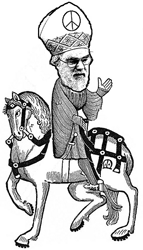
Iowahawk apologizes to Geoffrey Chaucer, Heere Bigynneth the Tale of the Asse-Hatte:
61 Then bespake the Po-Mo artist,62 "My last skulptyure was hailed as smartest
63 Bye sondry criticks at the Tate
64 Whom called it genius, brillyant, greate
65 A Jesus skulpted out of dunge
66 Earned four starres in the Guardian;
67 But now the same schtick withe Mo-ha-med
68 Has earned a bountye on my hed."
69 Sayed the Bishop, "that's quyte impressyve
70 To crafte a Jesus so transgressyve
71 But to do so with the Muslim Prophet
72 Doomed thy neck to lose whats off it.
73 Thou should have showen mor chivalrie
74 In committynge such a blasphemie."
75 And so it went, the pilgryms all
76 Complaynynge of the Muslim thrall;
This parody is a sufficient illustration (for now) to indicate the degree of success achieved by the Post/Modern epoch. I chose it nearly at random, so much more evidence abounds. Everyone is a master of the ironic twist. And everyone knows the limits of transgression both in its capacity for exhaustion and against the proscriptions induced by politically correct multiculturalism. The spirit of Liberalism has now been completely disseminated, especially now that the baby boom generation is crossing their middle age. From South Park and the Simpsons to the presidential elections. This is a mission accomplished moment for contemporary culture. I believe everyone is keenly aware of this. I also believe few of us are keen to talk about it, to ask whether or not we have yet exhausted this long lived cultural narrative from the latter half of the 20th century.
Why would this be so? Those who hold power do not naturally relinquish it easily. What was once a plasma of ideals and a kaleidoscope of new experience has hardened into orthodoxy, one that is serious about holding its' own. The music has resumed playing in the game of musical chairs and no one wants to relinquish their seat for fear of losing it. It's an old story. What tends to happen in situations like this is power becomes an end in itself and less the instrument for exercise of ideals. You can see this in the bulk of the reportage in the art world press, where there is a shift of attention from art work to art scene. Here's an example offhand. What about the artwork? When the drama of success within the system of the art world economy eclipses the discussion of the significance of the objects circulating in the art world, Houston's got a problem. Institutions and strategic alliances support infrastructures whose primary objective is survival and when you combine this with the adage that bureaucracy is the natural enemy of art (ahem), you have a world where objects take a poor second place to the dynamics of the system that adjudicates aesthetic value. It's as if everyone is playing Poker, each card an artist's life.
Politics*1
Jacques first tried to find a spur to the reexamination of the Post/Modern epoch in the anticipated apocalypse of Peak Oil. But I think that the real culprit isn't petrochemical zero sum games but in something far more stubborn and ingrown. No, the problem is deep inside our political and philosophical assumptions.
As I write these words, it is the summer of 2008, and Russia has invaded Georgia. CNN is on the television at the moment and Secretary of State Condeleesa Rice has just said with a punch: "This is not 1968." referring to the infamous invasion of Czechoslovakia. This seems to the bone of contention of our time, whether 2008 resembles 1968. This particular year is also the bloom of Liberal/Left politics. Currently the elections in the USA seem to be a referendum on whether or not 2008 is indeed the fruition of 1968.
If the Post/Modern epoch has a heart, let it be 1968. Paul Berman said it best in my dog eared copy of "A Tale of Two Utopias, The Political Journey of the Generation of 1968". He begins:
In the years around 1968, a utopian exhilaration swept across the student universe and across several adult universes as well, and almost everyone in my own circle of friends and classmates was caught up in it. The exhilaration was partly a fury against some well-know injustices, and against some injustices that had always remained hidden. Partly it was a belief, hard to remember today (except in a cartoon version), that a superior society was already coming into existence. And it was the belief that we ourselves - the teenage revolutionaries, freaks, hippies, and students, together with our friends and leaders who were five or ten years older and our allies around the world - stood at the heart of a new society. The exhilaration was brought on by circumstances close at hand - by the activities of two or three tiny left-wing organizations, by several strong personalities whom we loved to deplore, by chance happenings that could just as easily have turned out differently. But it brought on, most of all, by a confluence of very large events. Four enormous revolutions (social, spiritual, anti-imperial, and a revolution against the dictatorships of the Left -ed. fyi) were roiling the world at that one moment, each of those revolutions different in nature and purpose from the others, each of them far too huge and unprecedented for anyone, no matter how old and experienced, to comprehend at the time. And from each of those revolutions, and from the combination of all four, radiated an intense excitement, which came beaming down on us and on people like ourselves in scattered university towns all over the world.Utopia and fantasy ideologies and the unreality of Post/Modern perfection. Uh, ...Post/Modern perfection? That's right. When relativism elbows out the transcendent there is something like a heaven in another kind of end-of-the-road, isn't there? But then again, one has to die before one can get into heaven. Heaven on earth should always remain a metaphor, else it would be truly horrifying. Here's Berman on page 292:
Each of the revolutionary movements has described the purity in it's own way. It might be the purity of labor untouched by the speculative parasitism of bourgeois exploiters (for the Communists). It might be the genetic purity of the master race (for the Nazis). It might be the purity of the sacred word (for the Islamic fundamentalists) or the purity of the national culture (for revolutionary nationalists). And thus purified, unified, and defended, the Kingdom is bound to sweep away the confusions that come from doubt. It is going to liberate us from the terrors of the free circulation of things and ideas. It is going to establish the One - though not right now.
For all of the withering culture wars within the West, it must be said that Liberalism won. Decisively. What was once marginal is now mainstream. Civil Rights, alternative medicine, drugs, sex, race relations... it is a bit tedious to complete this list. We've come a long way and what's done has been done and done well. Nearly everyone across the political spectrum has become more Liberal and this should be recognized and celebrated. Listening to Berman, we should beware of perfecting the Post/Modern dream. As we stake our claim to virtue that we as a society should care for the helpless, we should also listen keenly to the critique that sometimes helping too much usually infantilizes those who you want to help. Roads to hell and good intentions and all that.
An Alternative Writ Small.
More Berman.
In the last chapter of his book, he introduces the two utopias indicated in the title of the book (p.254):Yet for all the lush variety in the many new analyses, there were if you look closely, only two main ideas. There was the idea that things change, sometimes in spectacular ways, but without ever arriving at any kind of order or final shape, and history is like a kaleidoscope. And there was the idea that things change, and eventually the chaos adds up to progress, and in a roundabout way history does get somewhere. Like a corkscrew.
In this, he is referring to two contemporary philosophers Andr? Glucksmann with the kaleidoscope and Francis Fukuyama with the corkscrew. At the end of the book, he discloses his preference:
The messages from these two authors, Glucksmann and Fukuyama, are at odds with one another, but I see no reason not to say that both messages seem true enough. In his less than satisfactory manner, Fukuyama has told us that the old discredited ideas about the progress of mankind ought to have their credit restored, though not necessarily in the nineteenth-century style. He has told us that progress need not be confined to the tiny elite portion of humanity whose origins lie in Northern Europe and Protestant culture. He has said that powerful and perhaps irresistible elements are fueling democracy's spread around the world, all of which is nice to hear; and that democracy's final triumph may turn out to be mediocrity's too, which we already knew (though some of us think of the mediocrity in a different way from Fukuyama). But Glucksmann has reminded us that, when it comes to grand projects that derive from Hegel or Marx, the world has some experience to go by. He has told us to shudder at certain possibilities that Fukuyama has never really ruled out: that before any kind of freedom or democracy spreads around the world, calamities no smaller than those of the twentieth century will keep breaking out. Glucksmann has told us that freedom's spread causes those calamities. And Glucksmann has told us how the world presently feels, not at some mythological end of history but at the real-life end of the quarter century that began with the dreams of left-wing revolution in the years around 1968 and ended with the outbreak of liberal democratic revolutions in the years between 1989 and 1994. The world feels this: humble, skeptical, anxious, afraid, shaken."
Berman wrote this in 1996. (He had already identified fundamentalist Islamism as a dangerous entity at that time, by the way.) What is great about Berman is that he jumps out of the deep ruts of Left/Right politics. I can wrap my head around hybrids and synthesis probably because I am a mongrel/half breed/heterogenaic offspring from a father born in Texas and a mother born in Quezon city. A typical American in other words. What I am arguing for here is the both/and instead of either/or, the latter being the standard mode of the culture wars, especially in the dialog of the art world. Politically and philosophically, our art world is a monoculture, and this should be seen as a grave danger. I would like to convert the antinomies of Post/Modernism versus Modernism into complimentaries, much in the way I like to regard abstraction and representation as being two poles of the same sphere, positive and negative, north and south; like what Einstein did with space/time.
Berman also struck a point regarding the thought of Andr? Glucksmann that touches a set of ideas I have written about earlier in this blog, in the post: Personal, Difficult Things. There, I wanted to identify an occupational hazard of the arts, that artists have to go to the dark side of existence because... that's where the art is. Here's the short version: Since history is a record of bad behavior (some great philosopher first said this, I lost the reference), and art is record of rebellion (isn't this the overarching lesson from the darkened room slide show/powerpoint lectures of art history: artist Y critiques the legacy of a primogenitor artist X by reconciling the life they live with the things they make... the differential is the story of art), we are therefore obliged to tether ourselves to life else we will probably succumb to death's dark shadow. This tether is the deus ex machina of G-d 's gift of freedom to the world. This tether is what gives us the ability to fling ourselves further into the abyss, to discover the nature of existence and convey this to others. Without the tether, all we have is a wretched suicidal tendency and the death of art itself. We have to become the kind of moth who knows the flame will kill it.
Here's Berman on page 294:
What can we learn, then, from the immense events that began sweeping halfway across the world in 1989 - these revolutionary events to which Glucksmann himself, from his writing desk in Paris with the volumes of Sozhenitsyn piled before him, had made a distinctive contribution? The lessons that he proposes are humble in the extreme - even if his way of describing these lessons is characteristically grandiose. He wants us to construct a new humanism, wholly unlike the old nineteenth-century humanism that wished to submit all peoples to the same idea of the good and the true. The new humanism should begin by recognizing what is inhuman in man. The eleventh commandment that Glucksmann wants to append to the biblical ten is this: to know thyself as capable of being a monster even if that means saying (and here the imp of excess wraps its fingers around Glucksmann's neck one more time), "Hitler c'est moi."
Self awareness beyond the paralytic catatonia of narcissistically inflected Post/Modernity, a self awareness that knows about the roots of Modernity in the Western tradition, of the legacy of Judeo/Christian culture. What I am arguing for is a Modernity that knows from whence it came, a modernity that acknowledges a kind of secular original sin.
-Tossa de Mar, summer 2008.
*
*
*
*
*
*
*
*
*1 For self disclosure, I should note that I have always been a Democrat but I have never felt obliged to vote strictly for the Democratic nominee. I regard charges of political infidelity with contempt. I think it's best to keep the party honest that way. I have been critical enough of my party to spend a few years as a non-Partizan but then I have reconsidered and have recently rejoined the Democratic Party with the intention of trying in some small way to change it. Here are some quick notes to sketch the nature of this change:
-To find a philosophical model for altruism other than the legacy of Marx. Eliminate the have/have not paradigm. Robin Hood was a problem and not a solution.
-To grow government down... we all have to fulfill the Modern dictum to "do more with less", and the bureaucracy of government should do the same. We should as Democrats do more good with less tax dollars, this is the gift of the information age.
-Doing more with less will help Democrats steal the thunder from Republicans who have been feckless with this central tenet in their belief system regarding small government.
-Re-identify ourselves with the anti-totalitarian nature of the story of the founding of the USA, i.e.: the Constitution. This also compels us to re-identify ourselves with religion and save secularism from the contest between the two.
-Become more specific and analytical in identifying ways to exert altruism with government assets. Use the strength of the information age towards this end. Create systems of audit and metrics for achieving demonstrable achievements in altruism.
*2 Just for the hell of it:
modernity I: the shock of the new... science, technology and industry changes life so much that new systems of organization requires the creation of new and inventive built environment, tradition takes a hit and society gets ripped apart and recongealed, reordered....
modernity II: the house of mirrors... media reflects intentions back on itself
modernity III: self awareness...
August 11, 2008
August 5, 2008
Some Drawings
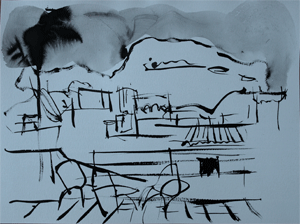
So I took my gear up to the guest room on the top floor and set a table up facing the terrace with its' view of Cap Tossa with the lighthouse and trees and foreground of pueblo architecture. A big plate of ink, a couple of brushes and let everything go.
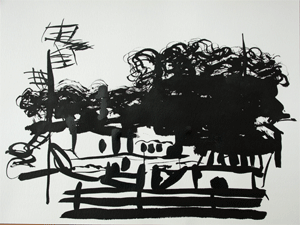
I've got a Frank Auerbach catalogue in the studio (written by Robert Hughes, very good), that must be the culprit here. I marvel at his work, the edge he has with representation, how it drives him to draft and redraft as each gaze delivers different information and a different attack on the canvas. His use of brushes is something I should learn more about. A brush can deliver a mass of paint in a scumble, skipping and leveling and describing all the while. It has the capacity of playing in the middle ground, a zone I have neglected in favor of the extents of thick and thin. It?s been a while.
The recent blogpost Toquen a Correr was influenced by images of Auerbach's process, drawing and redrawing as he grinds the image into place. I just flipped the pages instead.
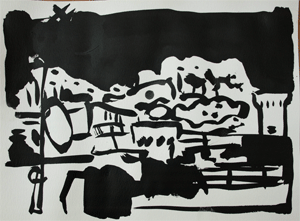
It must have been my recent visits to the Picasso Museum in Barcelona that first prompted thoughts of figuration, so I dusted off an old favorite figural theme of mine: the leafblower...
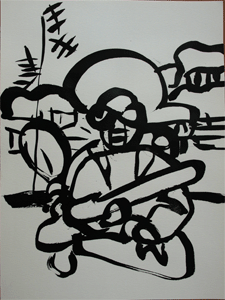
And for all you purist abstractionsits out there: relajate, tio.
Tranquilo.
I'm just trying to break the egg, yo.
Where Was I?
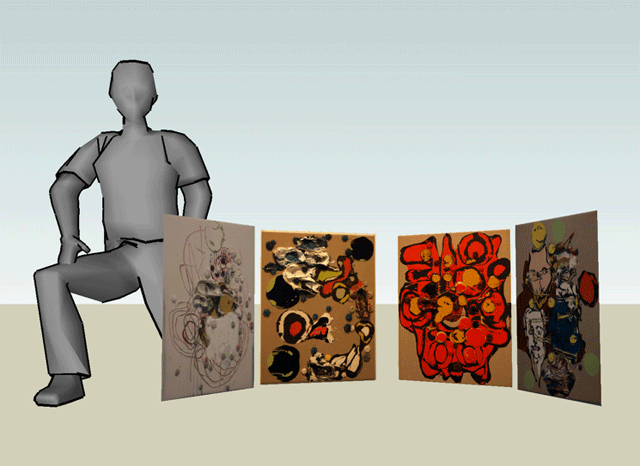
The last four paintings made before I left LA were an effort to suss out the ramifications of the thick and thin as it has developed in this body of work I refer to as wet into wet. The thin is paint laid down and sheared off with a blade. Around the time I began this blog, I dropped what amounts to five or more 225ml tubes of paint as another manner of touching the canvas. Around the same time I had began to rock masses of paint with my handmade daubers.
The big question now is where to go from here. How do I achieve the suppleness and grace in a deep embeddedness within this realm of painting? Issues such as subject, motif and theme start to itch. I'm starting to think that I have to recuperate my old friend drawing, a practice I had let wither for much too long.
August 3, 2008
Nacho on TV
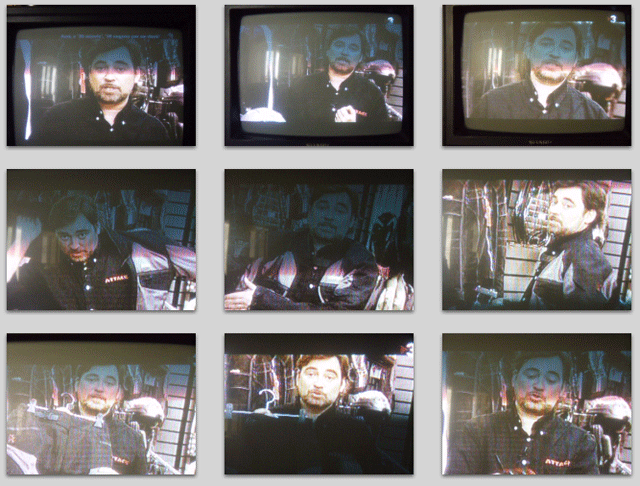
Nacho has been making TV spots featuring various motor bike accessories, he's becoming a lifestyle guru.
It's great to see your friends grow.
Broke 'Lympus

I must have dove a bit too deep. No more underwater shots this summer.
